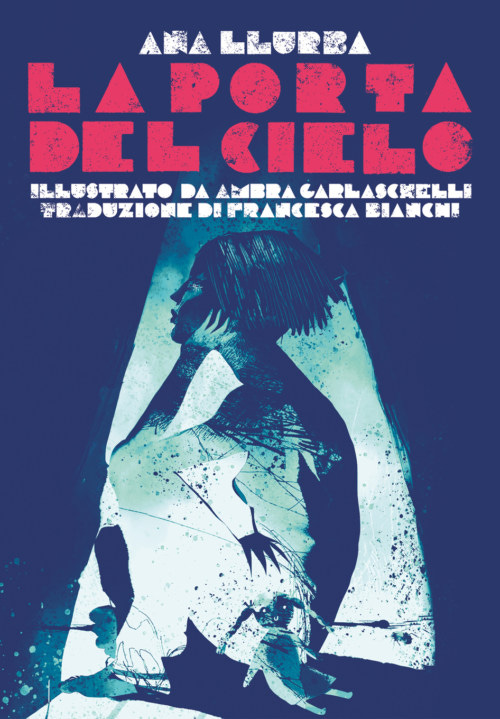The Feminine Abused: Vedantic Insights into a New Weird Novel
Ana Llurba masterfully explores the intersection of ritual and rebellion

In the metallic belly of a spacecraft converted into a temple, a community of prisoners waits. They call themselves "sisters," subjugated to the will of the Commander, a despot who proclaims himself a divine messenger. This man fuels their hopes by promising the coming of the Creator Fathers, celestial entities who should lead them to Orion, toward that mystical portal they call the Gate of Heaven. In this suffocating microcosm emerges the figure of Estrella, the latest arrival, who dares to challenge the established order with her thirst for understanding. Her rebellious spirit condemns her to isolation in the "pit," an earthen cavity where, dialoguing with her only companions - crawling insects - she retraces the path that led her to that prison. Llurba shapes a subversive work that, through the distorting lens of New Weird, probes the depths of female experience, from motherhood to sexuality, denouncing the control mechanisms that imprison the feminine.
Ana Llurba stands among the most interesting voices in New Weird literature, that literary strand that blends fantastic elements with everyday unease, where horror emerges from the distortion of ordinary reality and the boundaries between natural and supernatural become fluid, creating a sense of estrangement that permeates every page. New Weird rejects the classic conventions of fantasy and horror to explore hybrid territories, where the uncanny emerges from apparently normal situations.
Her voice captured me from the first lines of Family Constellations, a book that won the Celsius Prize at Semana Negra de Gijón and was a finalist for the Finestres Narrative Prize. Born in Argentina in 1980, Llurba lives between the United States and Berlin, where she combines editorial work with writing for cultural magazines and leading writing workshops.
La porta del Cielo (Eris Edizioni) - The Gate of Heaven, her first novel, now in three languages, takes us into a dark and narrow world. A ship turned sanctuary by a sect becomes a theatre of empty rituals and twisted orders. At the centre of the story is the obsessive waiting for the Creator Fathers, figures never present but always invoked, like in a Beckettian echo where the Godot who should give meaning to everything never arrives. The "sisters" live suspended in this infinite wait, repeating sacred gestures now emptied of meaning, while the "guardians of language" watch over order as rigid as it is absurd.
Ritualism as prison
As a Vedanta learner, I see clear echoes of Adi Shankara's thoughts in this work. In his famous Vivekachudamani, the Great Jewel of Discernment, the Vedic master writes: "Uddara nimittam bahuta veshah" - "for the sake of the belly many are the disguises." This phrase, which criticizes those who use sacred rites for gain, perfectly fits life on the ship, where the Commander, a self-proclaimed prophet of supposed astronaut gods, abuses the girls, masking violence as necessary punishment for celestial salvation. Sacred gestures have become empty, and rules have lost their meaning, serving only to legitimize his power and abuses.
For Shankara, rituals are useful only if they lead to true knowledge. In the novel, instead, we see how they become chains. The "sisters" live identical days, full of meaningless acts, under the watch of the "language guardians" who enforce absurd rules.
The descent into illusion
The religious universe of the book, full of double meanings, well demonstrates what Shankara calls avidyā, basic ignorance. Llurba artfully renders both the twisted way characters see the world and how this twisted world seems completely normal to them.
What's particularly striking is how Estrella is described in her strange dialogues: talking to the Catalina doll near the well and preaching to a group of cockroaches. These scenes aren't mere plot twists but show the gap between true spiritual search and the empty rituals Shankara criticized.
Illusory liberation and true Moksha
The "gates of heaven" in the title are the opposite of the moksha Shankara speaks of. They don't give freedom but imprison. They don't open the mind but lock it in increasingly narrow spaces. The author uses sharp black humour to create a work that goes beyond criticism of today's sects.
In this increasingly narrowing space, we see the effects of what Shankara feared: rituals that form means become ends, guides who from masters become tyrants. The book's brief chapters gradually lead us into this sick world, where the light that should save blinds, and the doors that should open close.
The power of narration
Llurba's imagery is powerful and touches deep chords. The ship becomes a closed world where the sacred becomes a cage. Scenes like the sun's rays darkening at the guardians' passage create a sense of anxiety that grows slowly but gives no respite.
The ending, which offers no easy answers, makes us think about the difficulty of understanding which is the right spiritual path. In this "new powerful and deplorable order," we see the risks Shankara indicated: the confusion between means and ends, between true search and its poor copy. The "gates of heaven" promise salvation but lead to prison, in a game of mirrors that captures and disturbs us.
The novel's strength lies in its ability to unite social criticism with deep reflection on the meaning of the sacred. Every scene and every dialogue carries multiple layers of meaning, just like the Vedic texts Shankara explained. And in the end, like the best spiritual texts, it leaves us with more questions than answers, but with a clearer vision of the dangers hiding behind every promise of too-easy salvation.
Feel free to leave a comment.
I have woven tales for anyone who cares to read them. My books await you on Google Books. Check also my stories on Medium.com.
I am eager to participate in research and produce content on Cross-Cultural Philosophy. Considering the many philosophy professors following Learn Vedanta Substack from universities across the five continents, I would be truly honoured to be involved in projects, as I have been recently approached. Please feel free to contact me.
I would be honoured if you considered subscribing to the Premium Contents of my Vedanta Substack and leaving feedback, comments, and suggestions on this page and by writing to me at cosmicdancerpodcast@gmail.com.
Visit my BuyMeACoffee page.
Thanks for reading.




